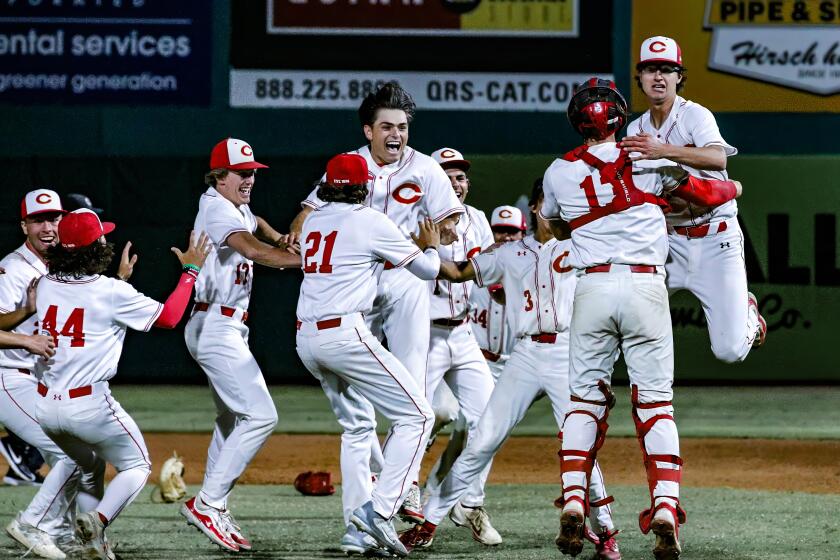For Rocky Bridges, baseball really was fun and games
- Share via
Rocky Bridges never took himself too seriously.
A major league journeyman, minor league manager and major league coach, he joked that he didn’t like the national anthem because every time he heard it, he had a bad day.
In truth, every day in baseball was a great day for Everett Lamar Bridges, whose infectious enthusiasm and proclivity for making people laugh superseded his playing ability.
“I had fun playing baseball,” he says. “Many of the players now, I’m not sure they have fun playing the game.”
Even bouncing among seven teams in 11 seasons did little to temper his zeal for the game, Bridges once noting, “I’ve had more numbers on my back than a bingo board.”
Bridges, who played for the Angels in their debut season of 1961, also said he wouldn’t eat snails because “I prefer fast food.” He described one club executive as so skinny he could tread water in a test tube. And he said of a diet drink he’d supposedly concocted, “You mix two jiggers of Scotch to one jigger of Metrecal. So far I’ve lost five pounds and my driver’s license.”
In a lengthy Sports Illustrated profile from 1964 — how many other power-deficient .247 career hitters are afforded such treatment by Sports Illustrated? — Bridges was described as “one of the best stand-up comics in the history of baseball.”
Vin Scully, whose second season with the Brooklyn Dodgers was Bridges’ rookie season with the club in 1951, recalls the former utility infielder as a “beautiful guy,” beloved by all.
And former major league pitcher Jim Bouton, author of “Ball Four,” called Bridges “my all-time favorite manager” even though Bouton never played for him.
“In fact, I’ve never even met him,” Bouton wrote in his 1973 collection of short stories, “I Managed Good, But Boy Did They Play Bad,” which took its title from a Bridges quote. “However, I’ve spent a good piece of my life sitting in bullpens around the country listening to different ballplayers talk about how much fun it was when they played for Rocky Bridges. …
“The reason Bridges was a great manager was that he understood that baseball is supposed to be mainly fun.”
Bridges, born in Texas but reared in Long Beach, signed with the Dodgers after graduating from Long Beach Poly High.
“It got me off riding my bicycle delivering The Times,” Bridges, 83, says from Coeur d’Alene, Idaho, where he moved from Long Beach 40 years ago. “I was the best peddler The Times ever had. I worked five years there and never missed a morning.”
As a ballplayer, Bridges had a front-row seat to history, including the famous National League pennant race of 1951, the 1952 World Series, the 1958 All-Star game and, in his swan song, the Angels’ inaugural season.
“I watched Bobby Thomson’s home run — from the bench, naturally,” he says. “I didn’t play much.”
Bridges’ longest stint with one team was four years with the Reds in Cincinnati, which he says was fortunate because “it took me that long to learn how to spell it.”
When he was selected for the All-Star game with the Washington Senators in 1958, Bridges notes, “That surprised everybody. They were close to launching an investigation.”
Bridges didn’t get into the game, nor did he play in the ’52 World Series, won by the New York Yankees over the Dodgers.
He hit only 16 home runs, noting after ending a two-year drought in 1961, “I’m still behind Babe Ruth’s record, but I’ve been sick. It really wasn’t very dramatic. No little boy in the hospital asked me to hit one. I didn’t promise it to my kid for his birthday, and my wife will be too shocked to appreciate it. I hit it for me.”
Bridges’ charm and endless quips — “ Tommy Lasorda’s curve had as much hang time as a Ray Guy punt,” he once noted — allowed him to find a special niche in baseball.
Scully says that Bridges, an inveterate tobacco chewer, enjoyed such a special bond with Pee Wee Reese that he once convinced the veteran Dodgers shortstop to try a chew.
Reese obliged, inadvertently swallowed the mess during infield practice and ran straight off the field into the clubhouse, sitting out the game because of stomach distress.
Says Scully, who had endured a similar experience as a player at Fordham: “I had once said to myself, ‘How dumb can you be?’ But then when Pee Wee did it, I thought, ‘Well, I’m in illustrious company now.’ But that was the Rocky influence, even with Pee Wee. Pee Wee would try it because Rocky suggested it.”
Bridges retired after the 1961 season — “I think they asked me to,” he says — and in 1962 with the Angels launched a nearly three-decade career in coaching and managing.
A father of four, he won 1,300 games as a minor league manager and coached under Bill Rigney and Lefty Phillips with the Angels. But he never got a shot at managing in the majors.
His last job in baseball was as a traveling infield instructor for the Pittsburgh Pirates in the early 1990s.
Settling in Idaho, “I knew some places I could tell a few lies,” says Bridges, a widower. “Up here, they didn’t know a damn thing about me, so I could tell them how great I was.”
All told, he wasn’t bad.
“I managed, I scouted, I coached, I did everything,” he says. “I was like a house without toilets. I was uncanny.”
More to Read
Go beyond the scoreboard
Get the latest on L.A.'s teams in the daily Sports Report newsletter.
You may occasionally receive promotional content from the Los Angeles Times.










